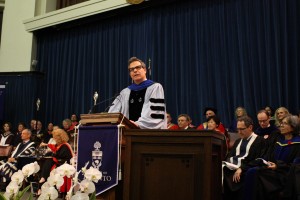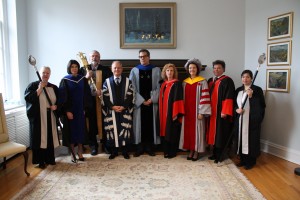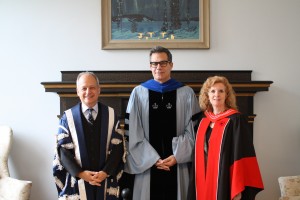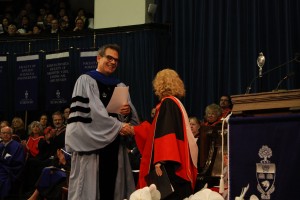MPI Cities Director, Richard Florida, was invited to deliver the commencement address at the Autumn 2015 Convocation for the University of Toronto. Commencement was held on November 10th, 2015. Richard Florida’s remarks are below:
Thank you, President Gertler. Thank you Provost Regehr for that kind introduction. And thank you to all of the Dean’s and and to my distinguished colleagues that are here today.
I want to extend my heart-felt congratulations to everyone who is graduating today. Some of you have grown up here in Toronto, many of you have come here from far distances and have studied here separated from your families and loved ones. This occasion is a tribute to the hard work, the long nights and the perseverance each of you has shown. I also must congratulate your families, your significant others, your husbands and wives, your partners, your children, all the moms and dads, grandmothers and grandfathers who are here to support you and have supported you all along the way.
What a tremendous privilege it is to receive a degree like this. A degree in higher education. It’s your ticket to a better and more fulfilling life. It’s the best and highest paying investment any of us can make. You’ve been lucky to study in one of the world’s truly great universities, one whose ranks continues to rise each year; and to do so in Toronto, which is also one of the worlds greatest cities. Just being part of this city, living and studying amidst all of its incredible diversity, its incredible creative affirment, its energy is an education in and of itself.
I’m humbled and honoured to be here with you today, and to be asked to overshadow an event that’s really about you. It’s astonishing that I’ve gotten to this point. Let me share some insight I’ve gained at key junctures along the way.
I come from incredibly humble roots, probably like many of you. My grandparents were peasant farmers from Southern Italy, the area around Naples. They had zero education, not one year of formal education. They came to North America in search of a better life. My dad grew up in the Great Depression, he left school in the the seventh grade to take up work in a factory. I grew up in the area of Newark, New Jersey and come from very working class roots. I had a very different kind of accent back then. I hope your experience here at the University of Toronto has changed your life as much as my experience did when I got the privilege to go to university.
The big turning point in my life came when I got a scholarship to university in the state where I grew up, Rutgers, the State University of New Jersey. It changed my life in ways I couldn’t imagine. I was always curious; I was always drawn to the world of ideas. But I had no idea that it was there. I had to hide the fact that I was smart for fear of being beat up by my classmates. But when I got to university a whole new world opened up to me as I’m sure it did for you. I found a place where I learned to discover, I found my passion. I found a place for the first time where I could be myself and follow my interests.
My parents wanted me to go a different route. Like so many working class people, they wanted me to become a doctor or a dentist. When I told them I didn’t want to do that, they literally called an entire family meeting of about 50 of my aunts and cousins to convince me that I should do that. But I got much more than an education from my university years, I got a purpose. And I hope you do too.
As a sophomore I took a class in urban cities and geography. It changed my life. My professor gave us an assignment to walk the streets of lower Manhattan – Little Italy, Greenwich Village, Soho and more – and to write up what we saw. I was hooked. I found my love of cities, I knew I’d become a researcher and a scholar. But I didn’t tell my parents that. I told them I’d study pre-law and go on to law school. My mother liked that because knowing me she said “Richard, you’ll be good at that, you’re a good talker.”
I did well enough to get a scholarship to MIT and I took a PhD at Columbia. When I was doing my PhD there were hardly any jobs for professors, it was in the middle of a tremendous recession. I didn’t care, I was doing what I loved. My first teaching job paid exactly as much as my father made in the factory where he worked. I lived hand to mouth, paycheque to paycheque, in a small apartment. I met a young professor, roughly my age at the time, named Meric Gertler: A dear friend of ours who is a professor of geography at Oxford introduced us and the rest as they say is history. I was so fortunate eight years ago to make my way to this incredible university, in this incredible city, where my wife and I love living as much as I love teaching here.
I’m not the first person to tell you this, but the most important thing to do is to do what you love. I can’t tell you how many distraught former students I hear from who tell me they took a job just because it offered the best money and they gave up their passion and it took them off the path. Stay true to your passion. You’ll always need to make a living, but all those nights I spent in graduate school, getting a PhD, was the hardest thing I ever did, being a professor was actually much easier. All those early years even when I had no money, I was excited and happy to go on about every day, because I was doing what I love. Follow your dreams, follow your passion – not what other people tell you to do – do what you want to do, what truly excites you and gets you excited every day.
All of us here are smart. You wouldn’t have gotten in to the University of Toronto and you wouldn’t have graduated. But, true success requires not just smart work, it requires hard work. The people I know who are the most accomplished work incredibly hard, as all of your faculty do every day. As Thomas Edison famously said: “Real success is one percent inspiration and 99 percent perspiration.” Nothing worth doing comes easily.
Take advantage of each and every opportunity that comes your way. Don’t let a single one pass you by, especially early in your career as you take your next steps and move on. Spread your bets really widely. Every successful venture capitalist who invests in startup companies says the same thing. They don’t invest in one company; they invest in many companies. Musicians write song, after song, after song. Only a few of them become hits. I’ve written dozens of books, and hundreds of articles, and had one best seller. The important thing is that you take those opportunities, you seize them, and understand – and this is something that is really important to say in this city and in this country- don’t be afraid of failure. Embrace it and learn from it. I have failed many times. I have gotten so many rejections. Trust me, all of my faculty colleagues know what it feels like to get our papers rejected, our book proposals rejected, our grant proposals rejected. But we humans learn by failing, we learn by trial and error. Yet, we’re brought up to believe that only success is rewarded. Failure is nothing to be ashamed of. It’s something to learn from. But don’t get mired in your rejections. Fail fast but recover quickly.
Most of all, follow your gut, and your instincts. We’ve all been trained to be rationalists. But really I can tell you this, after more than 30 years in the university, it’s your intuition and your gut that point you to the really new and big ideas, and point you in the direction you should go. But turn that intuition and that gut feeling into hypotheses, into real, testable questions that you can test along the way. Stay true to your dreams your intuition, your inner most desires, never lose sight of them. They are are your true guide posts.
Most of all – maybe not tomorrow, or the next day, or even the next year – as you move on to your lives and your careers, understand that the greatest joy of life is to lead others by serving. This is something I’ve learned at this great university more than any other place; we are committed to learning by serving. Studying, getting an education, getting ahead, getting good grades, those are typically individual achievements. We’ve been taught, we’ve been schooled, to think in individual achievements. But over the course of your life you’re going to have to invest in others, your families, your spouses, your children, your grandparents, your community. I can tell you to a person the most successful people I have met or studied say the same thing: their truest, purest joy comes from serving, mentoring, leading, and developing others. This is something that you are well prepared for. This is something that you’ve worked hard for and that your work has prepared you splendidly for.
Congratulations and best of luck as you embrace this day and take your next steps toward what I am sure will be an exciting, meaningful, and fruitful future!



